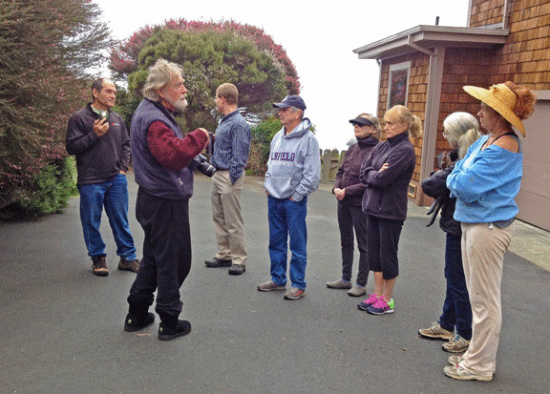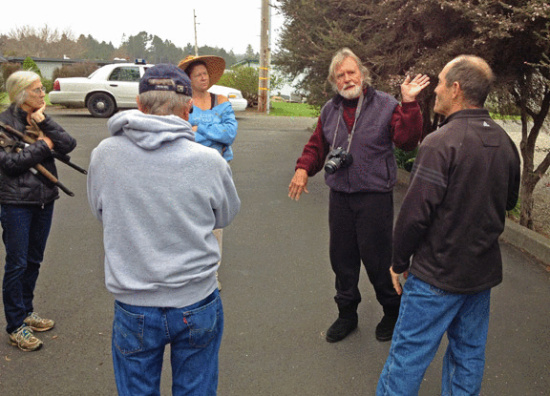John Frame gives his interpretation of access issues on the Wagner Street Trail to residents (from left) Steve Saunders, Trinidad City Manager Dan Berman, city Planning Commission chairman Mike Pinske, Maria Bartlett, Ann Pinske, Cathy Reid and Toni Magyar. By Ted Pease.
For the umpteenth time in nearly a quarter-century, tempers and voices are rising in Trinidad over the protected coastal bluff trail above Old Home Beach.
This morning about a dozen residents, many of whom meet at the Wagner Street Trail monthly to trim weeds and assure public access, ran straight into John Frame, the homeowner through whose driveway the trail easement passes.
There was pushing and shoving between Frame and the trail trimmers, including Larry Saunders, who was carrying a weed trimmer. Several calls went out to sheriff’s deputies.
The altercation is just the latest in a saga that began in the 1980s, with years of rancorous litigation between Frame and Trinidad that nearly bankrupted the city a decade ago. Various court orders, arbitration and settlements specify the course and boundaries of the old Native American trail, which passes above the ancient Tsurai tribal village site between Wagner Street and Parker Creek. But Frame, a retired property developer, still maintains that the public is trespassing on his property in using or “improving” the path.
There was no trimming done Monday. Frame blocked the volunteer trail crew as they walked along the 4-foot easement that passes down his driveway between the street and the bluff. While deputies waited in the street, Frame and the residents rehashed many of the same issues that have taken so much of the City of Trinidad’s time, attention and funds over the past two decades.
The whole issue boils down to public access to the trail. The public easements were in place when Frame purchased the property in the 1980s — the original “Old Wagon Road” followed what had long been a native path along the bluff, and entered Trinidad right where Frame’s house now stands. But Frame has long resented — and often yelled at — hikers and picnickers who have tried to use the trail.
Among those blocked by Frame Monday morning was Mike Pinske, a longtime Trinidad resident and current chair of the city’s planning commission. As he listened to Frame argue Monday, he just shook his head.
“What struck me,” Pinske said later, “was that after all these years and all these lawsuits, John Frame still considers that his private property. The letter from the Coastal Commission went right past him, it didn’t even register.”
“The letter” may be the latest glimmer of a resolution to the ancient squabble. The California Coastal Commission (CCC), a state agency with jurisdiction over coastal land use, informed the city Tuesday that Frame’s “No Trespassing” signs and “bollards” (4x4-inch posts) planted in the trail access right-of-way “are unpermitted development that is discouraging public access to the Wagner Street Trail, other trails in the area, and the public beach at Indian Beach.”
Frame is “violating public access,” the CCC letter says, asking the city to enforce previous settlement agreements and get Frame to remove his signs and “bollards” within two weeks, or by April 7. If the city chooses not to take action, Trinidad officials may “request that the Commission assume primary enforcement,” which may include fines against Frame of up to $11,250 per day for each violation.
Frame has argued that the signs — “No Trespassing” and “Private Drive” at the entrance to Wagner Street and at the easement entrance onto his driveway — are legal and were approved by the Trinidad Planning Commission. But Pinske says the commission has never approved the signs or Frame’s posts blocking the trail.
Frame met with the Coastal Commission on March 2, according to the letter, and “was clearly put on notice that the subject signs and bollards are a violation of the public access provisions of the Coastal Act … [and] must be removed.”
The city also contends that Wagner Street, a dead-end residential street along the bluff, is a public roadway, but Frame says it is private, and that it is within the property owners’ right to ban the public — and their dogs.
Residents who were part of Monday’s exchange with Frame were clearly frustrated. “How long can one man hold the town hostage?” one asked as the driveway confrontation broke up. Frame is “deluded,” another said.
Trinidad City Manager Dan Berman also was present Monday morning. While he understands the residents’ frustrations — and Frame’s — Berman said, he urges residents not to take “a vigilante approach” to trim back the weeds on the Wagner Trail.
Berman met in February with the Coastal Commission about the trail issue. He says the matter will come before the Trinidad City Council on April 8, when the council will decide how to proceed. Although the city might be happy to have the Commission take on Frame over the signs and posts, other issues must be resolved: whether Wagner Street is public or private, and how much of the trail should be maintained to assure public access.
Trinidad resident Steve Saunders, one of the organizers of the trail-trimming effort, was the brunt of much of Frame’s anger Monday morning. Afterward, although clearly frustrated, Saunders said he thought there might be reason to hope that there could be an end in sight for a conflict that has divided a town for years.
“The most maddening thing about all this is that, up until now, no party to the [dispute] — the city, the homeowner, the CCC, the Trinidad Coastal Land Trust, the California Coastal Conservancy — has taken action to live up to their part of the 1994 stipulation and the 2005 settlement agreement,” Saunders said, referring to two prior “resolutions” between Frame and the city.
If the Coastal Commission will step in and enforce those legally binding agreements, Saunders said, maybe there’s hope.
Trinidad resident John Frame disputes Wagner Street Trail access issues with Steve Saunders (right) as other “vigilante weedwhackers” listen. By Ted Pease.
PREVIOUSLY
- “Town is on Brink Over Trail at Sea’s Edge” (Los Angeles Times, Oct. 27, 2003)
- “Rotten Borough” (North Coast Journal, Aug. 31, 2006)
- “Best Dueling Signs” (North Coast Journal, 2012)
DOCUMENT


CLICK TO MANAGE